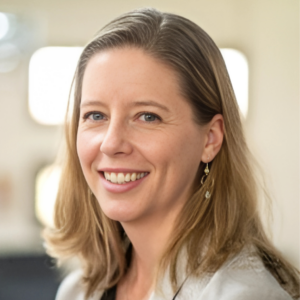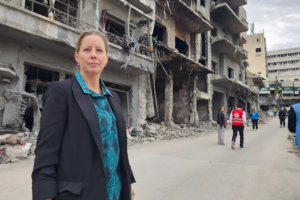OCHA’s Kristen Knutson on a Life in Humanitarian Work
“I could find myself in a disaster and need help, and I hope there is somebody who would be there to provide assistance like OCHA does,” says Kristen Knutson, Head of Office for the UN Office for the Coordination of Humanitarian Affairs (OCHA) in Lebanon. “The values of OCHA really align with how I was raised.”

Kristen Knutson’s career with the United Nations spans over two decades. Since January 2024, she’s been leading OCHA’s office in Beirut, Lebanon—her seventh duty station—where she’s navigating one of the region’s most intense conflicts in recent history.
Knutson’s journey into humanitarian work was driven by a commitment to service and deep curiosity. “I have always been curious about the world and about the different kinds of people, cultures and languages in it,” she explains. That curiosity evolved into a desire to contribute, not just to explore.
“I found humanitarianism to be a place where I could marry my own personal passion with a professional career. That really makes me feel fulfilled.”
Through a lot of persistence and patience, Knutson pieced together a few short-term contracts and eventually earned a placement with OCHA.
On the Ground, Around the World
Since joining the organization, Knutson has supported emergency response in more than a dozen crises. From Uganda’s post-conflict recovery, drought in Ethiopia, Haiti after the devastating 2010 earthquake and Burkina Faso during its darkest years, she’s seen it all.
“One of the things that I love most about the work I do with OCHA is that you get to see the full gamut of the human experience,” she says. Reflecting on Haiti, she recalls, “It was one of the most intense and rewarding experiences of my life… I felt like I was doing something every day that helped people or that saved lives.”
She landed in Lebanon at a time when conflict had displaced nearly a million people in just one week in late 2024. “We had to swing around and pivot once again to following people who are returning upon cessation of hostilities and who still need humanitarian assistance,” she says.
What keeps Knutson going? “It’s a calling,” she says without hesitation. “A calling that makes me feel like I’m contributing to the betterment of humanity. I truly believe that all human beings are equal and equal in dignity.”
“I truly believe that all human beings are equal and equal in dignity.”
This deep belief stems from her upbringing in Madison Lake, Minnesota. “I grew up in a community that helped each other—with annual food donations, volunteering, visiting older people during holidays… there was a real sense that volunteerism was part of being a good member of the community.”
“I grew up in a community that helped each other—with annual food donations, volunteering, visiting older people during holidays… there was a real sense that volunteerism was part of being a good member of the community.”
The Power of Humanitarianism
One of the most striking moments in her career happened recently in Lebanon. “We worked with a national NGO—the Order of Malta—who helped evacuate 1,000 people from a conflict zone,” Knutson shares. OCHA helped ensure the safety of the convoy through civil-military coordination.
“Seeing those two NGO vehicles turning around and immediately going back… to provide healthcare, food and water to those who remained. They had stayed throughout the conflict in that community, providing support.” That’s the moment that moved her the most.
Challenges on the Horizon

Because Knutson is no stranger to conflict, she’s keenly aware that the humanitarian sector is under intense pressure—financially and politically. And she doesn’t sugarcoat it: “We are already seeing the impact. The World Food Program has had to cut 40% of assistance… and that could go up to 70%.”
She’s especially concerned for local NGOs. “So many of them depend on the United States for funding… We’re seeing an immediate impact in terms of drastically reducing the number of people assisted and the quality of assistance.”
Still, she believes in the resilience of humanitarianism. “We will find a way because humanitarian work must continue,” she says. “But I’m really worried about the people who need help now not getting it.”
Giving Back and Paying Forward
As an American, Knutson also thinks a lot about the connection between global humanitarian assistance and her ties back home. “Minnesota produces more food than it consumes… and a lot of it is sold to humanitarian organizations,” she explains. “There’s an economic benefit to being part of global humanitarian action. But with funding cuts, there’s a cost to people back home as well as those we serve.”
“Minnesota produces more food than it consumes… and a lot of it is sold to humanitarian organizations,” she explains. “There’s an economic benefit to being part of global humanitarian action. But with funding cuts, there’s a cost to people back home as well as those we serve.”
In the end, what makes her work matter most is not the metrics—it’s the people. “My work matters because people we’re supporting tell us it matters,” Knutson says.’”
Whether it’s providing food and water or helping children return to school, Knutson believes the goal is always the same: “To help people get to a place where they can fulfil those deeper objectives that they have.”
Through OCHA, she’s helping the organization and the communities she serves do just that—fulfill their deeper, bigger objectives.